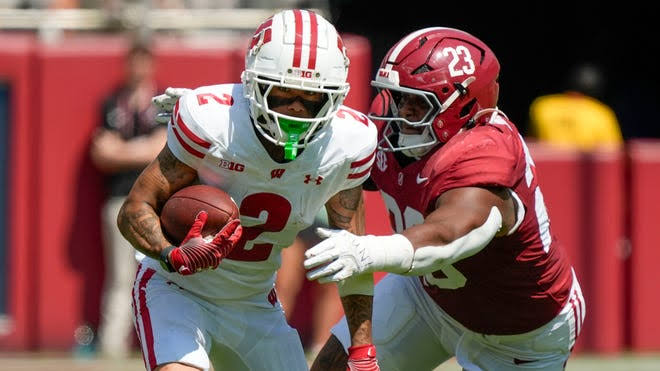
In a dramatic turn of events that could have major implications for the Crimson Tide’s season, Alabama saw one of its defensive stars ejected for targeting during the second half of their high-stakes clash with the Georgia Bulldogs. The call came at a pivotal moment, adding yet another layer of intensity to one of the SEC’s most fiercely contested rivalries.
The play in question occurred midway through the third quarter, with Georgia driving deep into Alabama territory. On a crucial second-down snap, Georgia’s quarterback attempted a pass over the middle. The receiver caught the ball but was immediately met by a hard-hitting tackle from the Alabama defender. Officials quickly threw a flag, citing “forcible contact to the head or neck area of a defenseless player.” After a brief review, the ruling of targeting was confirmed, resulting in the defender’s ejection from the game.
The loss of such a key player immediately changed the complexion of Alabama’s defense. Known for his ability to read plays, deliver punishing hits, and set the tone for the rest of the team, his absence left the Crimson Tide scrambling to make adjustments. Georgia capitalized on the next few drives, using quick passes and running plays to exploit the gap in Alabama’s secondary.
Nick Saban, Alabama’s legendary head coach, was visibly frustrated by the call. “You never want to see a player ejected, especially in a game of this magnitude,” Saban said during his postgame comments. “But we respect the rules, and we’ll use this as a teaching moment. We always stress proper tackling technique to avoid these situations.”
The targeting rule has been one of the most debated in college football over the last decade. Designed to protect players from dangerous head-to-head collisions, it has undoubtedly made the game safer. However, critics argue that the punishment—automatic ejection—can be too harsh in cases where intent is unclear or where contact is incidental. Saturday’s ejection reignited that debate, with fans taking to social media to voice their opinions.
Georgia’s offense seemed to feed off the momentum shift. The Bulldogs, already known for their disciplined approach, executed with precision and eventually turned a close contest into a more comfortable lead. Still, Alabama refused to fold, with its backup defenders stepping up to make key stops late in the fourth quarter.
The ejected player will now miss the first half of Alabama’s next game, per NCAA rules. That could be a significant blow, as the Crimson Tide prepare for another tough SEC opponent. The coaching staff will have to find ways to adjust their defensive scheme to compensate for his absence.
Ultimately, the incident served as a reminder of how quickly fortunes can shift in college football. One play can swing momentum, change strategy, and alter the course of a season. For Alabama, the challenge now will be to regroup, reinforce their tackling fundamentals, and ensure they are ready to bounce back when their star defender returns.
Be the first to comment